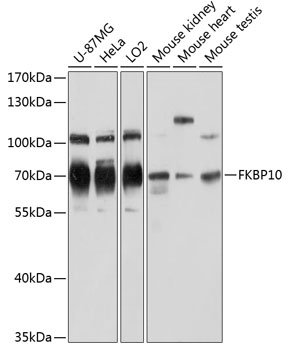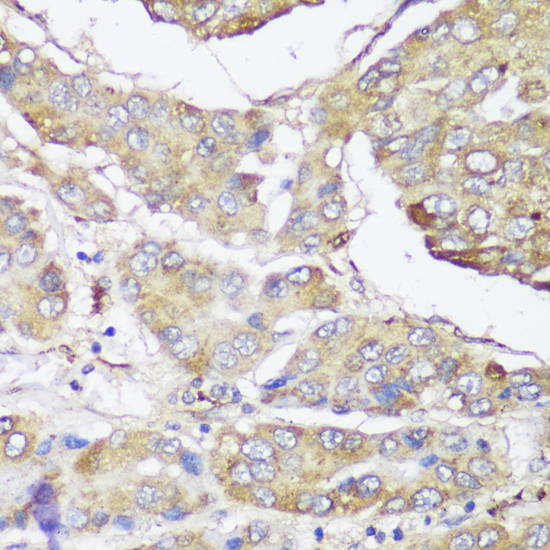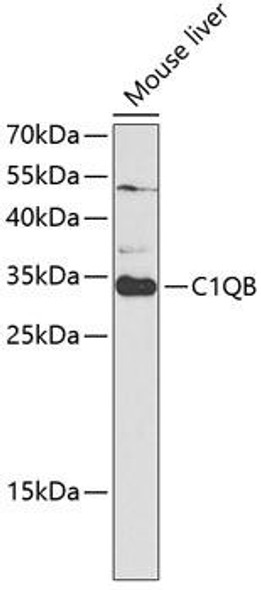Anti-FKBP10 Antibody (CAB12931)
- SKU:
- CAB12931
- Product type:
- Antibody
- Reactivity:
- Human
- Mouse
- Host Species:
- Rabbit
- Isotype:
- IgG
- Antibody Type:
- Polyclonal Antibody
- Research Area:
- Cell Biology
Frequently bought together:
Description
| Antibody Name: | Anti-FKBP10 Antibody |
| Antibody SKU: | CAB12931 |
| Antibody Size: | 20uL, 50uL, 100uL |
| Application: | WB IHC |
| Reactivity: | Human, Mouse |
| Host Species: | Rabbit |
| Immunogen: | Recombinant fusion protein containing a sequence corresponding to amino acids 303-582 of human FKBP10 (NP_068758.3). |
| Application: | WB IHC |
| Recommended Dilution: | WB 1:500 - 1:2000 IHC 1:50 - 1:200 |
| Reactivity: | Human, Mouse |
| Positive Samples: | U-87MG, HeLa, LO2, Mouse kidney, Mouse heart, Mouse testis |
| Immunogen: | Recombinant fusion protein containing a sequence corresponding to amino acids 303-582 of human FKBP10 (NP_068758.3). |
| Purification Method: | Affinity purification |
| Storage Buffer: | Store at -20°C. Avoid freeze / thaw cycles. Buffer: PBS with 0.02% sodium azide, 50% glycerol, pH7.3. |
| Isotype: | IgG |
| Sequence: | FDSS YSRN HTYN TYIG QGYI IPGM DQGL QGAC MGER RRIT IPPH LAYG ENGT GDKI PGSA VLIF NVHV IDFH NPAD VVEI RTLS RPSE TCNE TTKL GDFV RYHY NCSL LDGT QLFT SHDY GAPQ EATL GANK VIEG LDTG LQGM CVGE RRQL IVPP HLAH GESG ARGV PGSA VLLF EVEL VSRE DGLP TGYL FVWH KDPP ANLF EDMD LNKD GEVP PEEF STFI KAQV SEGK GRLM PGQD PEKT IGDM FQNQ DRNQ DGKI TVDE LKLK SDED EERV HEEL |
| Gene ID: | 60681 |
| Uniprot: | Q96AY3 |
| Cellular Location: | Endoplasmic reticulum lumen |
| Calculated MW: | 38kDa/64kDa |
| Observed MW: | 70kDa |
| Synonyms: | FKBP10, BRKS1, FKBP65, OI11, OI6, PPIASE, hFKBP65 |
| Background: | The protein encoded by this gene belongs to the FKBP-type peptidyl-prolyl cis/trans isomerase (PPIase) family. This protein localizes to the endoplasmic reticulum and acts as a molecular chaperone. Alternatively spliced variants encoding different isoforms have been reported, but their biological validity has not been determined. |
| UniProt Protein Function: | FKBP10: PPIases accelerate the folding of proteins during protein synthesis. Defects in FKBP10 are the cause of osteogenesis imperfecta type 6 (OI6). OI6 is a moderate to severe, autosomal recessive form of osteogenesis imperfecta characterized by increased serum alkaline phosphatase levels and bone histology exhibiting a fish scale-like lamellar pattern. Osteogenesis imperfecta defines a group of connective tissue disorders characterized by bone fragility and low bone mass. |
| UniProt Protein Details: | Protein type:Isomerase; EC 5.2.1.8 Chromosomal Location of Human Ortholog: 17q21.2 Cellular Component: endoplasmic reticulum membrane Molecular Function:FK506 binding; peptidyl-prolyl cis-trans isomerase activity Disease: Bruck Syndrome 1; Osteogenesis Imperfecta, Type Xi |
| NCBI Summary: | The protein encoded by this gene belongs to the FKBP-type peptidyl-prolyl cis/trans isomerase (PPIase) family. This protein localizes to the endoplasmic reticulum and acts as a molecular chaperone. Alternatively spliced variants encoding different isoforms have been reported, but their biological validity has not been determined.[provided by RefSeq, Nov 2009] |
| UniProt Code: | Q96AY3 |
| NCBI GenInfo Identifier: | 23396594 |
| NCBI Gene ID: | 60681 |
| NCBI Accession: | Q96AY3.1 |
| UniProt Secondary Accession: | Q96AY3,Q7Z3R4, Q9H3N3, Q9H6J3, Q9H6N5, Q9UF89, |
| UniProt Related Accession: | Q96AY3 |
| Molecular Weight: | 38,950 Da |
| NCBI Full Name: | Peptidyl-prolyl cis-trans isomerase FKBP10 |
| NCBI Synonym Full Names: | FK506 binding protein 10 |
| NCBI Official Symbol: | FKBP10 |
| NCBI Official Synonym Symbols: | OI6; OI11; BRKS1; FKBP65; PPIASE; hFKBP65 |
| NCBI Protein Information: | peptidyl-prolyl cis-trans isomerase FKBP10 |
| UniProt Protein Name: | Peptidyl-prolyl cis-trans isomerase FKBP10 |
| UniProt Synonym Protein Names: | 65 kDa FK506-binding protein; 65 kDa FKBP; FKBP-65; FK506-binding protein 10; FKBP-10; Immunophilin FKBP65; Rotamase |
| Protein Family: | Peptidyl-prolyl cis-trans isomerase |
| UniProt Gene Name: | FKBP10 |
| UniProt Entry Name: | FKB10_HUMAN |




![Anti-FKBP10 Antibody (CAB19870)[KO Validated] Anti-FKBP10 Antibody (CAB19870)[KO Validated]](https://cdn11.bigcommerce.com/s-39x6lpnvxv/images/stencil/590x590/products/21577/19777/anti-fkbp10-antibody-cab19870ko-validated__36782__09104.1644252658.jpg?c=1)




